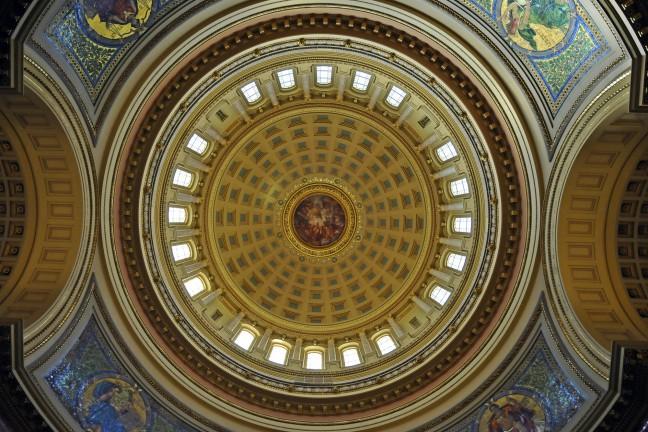It is clear that the financial state of Wisconsin will be a central issue in the gubernatorial campaign, and the Legislative Fiscal Bureau just dropped a $1.8 billion bombshell into the race.
On Monday, the LFB estimated that the budget will face a nearly $1.8 billion shortfall over the next two years that needs to be rectified as soon as possible to maintain normal operations for many state programs. Frankly, Gov. Scott Walker’s re-election team has quite a job to do to convince us this mess shouldn’t be placed squarely on his plate.
In reality, however, there is no ambiguity; this deficit is directly the fault of the Walker administration and reckless budgeting practices.
As many readers know, in 2011 Walker and the Legislature instituted Act 10, a controversial law dramatically cutting benefits and compensation to many public employees including teachers. Many of us also remember the protests and national news coverage that accompanied this. Throughout all of the protests and Jon Stewart bits, Walker continued to insist that the painful cuts were necessary to balance a $3.6 billion budget deficit created through irresponsible budgets in the Doyle years.
The kicker here is that Walker’s first budget was fiscally sound. It certainly did eliminate the $3.6 billion deficit through painful cuts across the entirety of state government and even resulted in a projected revenue surplus. Walker asked for painful sacrifices from those who had already given much. On the backs of those sacrifices, the governor achieved his balanced budget.
The current crisis is rooted in Walker’s actions this past January, when the LFB projected $386 million in additional budget gains from Walker’s painful but successful budget, and he immediately converted it into vast tax cuts. Since January, however, that projected revenue has not materialized. The Department of Revenue recently announced that revenues fell short $281 million in the 2014 fiscal year (which ended on June 30, 2014) and will continue to fall short in the upcoming year. The projections that Walker originally used to create the tax cuts turned out to be inaccurate, and this deficit is the direct result of those tax cuts.
Public comments from Walker’s camp dismiss the projections with a wave of a hand, citing future job growth and responsible fiscal management as solutions to structural problems. The promise of increasing tax cuts in the face of the deficit, however, seriously calls any claim by Walker on how to handle this deficit into question.
The worst part is that Walker has now given up the gains he fought so hard to secure off the backs of public employee sacrifice for a needlessly deep tax cut. Had Walker waited to ensure the revenue would materialize rather than pulling the trigger on big tax cuts as soon as the estimates were available, we would not be in this current situation. We simply would not.
This fiasco raises serious questions about Walker’s leadership and fiscal sense. His camp is now hand-waving the new projections away as inaccurate or subject to change, but back in January, he was perfectly content to accept these projections as gospel and used that estimate to create new tax cuts. Just because the estimate is no longer convenient, Walker is backing away from the apolitical Legislative Fiscal Bureau projection.
Here is the situation: tax cuts were made based on expected revenue, which never materialized, therefore directly resulting in this deficit. Based on this, Walker’s tax cuts can only be seen as recklessly wishful thinking that needs to be addressed.
The new governor, whether it is Mary Burke or Walker in a second term, needs to immediately address the deficit in a serious way. The state will need substantial revenue growth just to close this gaping hole, without taking into account that a source for increased Medicaid funding will need to be found. Additionally, many agencies such as the University of Wisconsin system, public schools and the corrections system have been operating for several years at stagnant budget levels, and are demanding increased money to fulfill their mandated missions.
The budget structural deficit should be the central issue in the fall election. Walker created this fiscal disaster and he should be held accountable for it.
Adam Johnson ([email protected]) is a graduate student at the La Follette School of Public Affairs.














